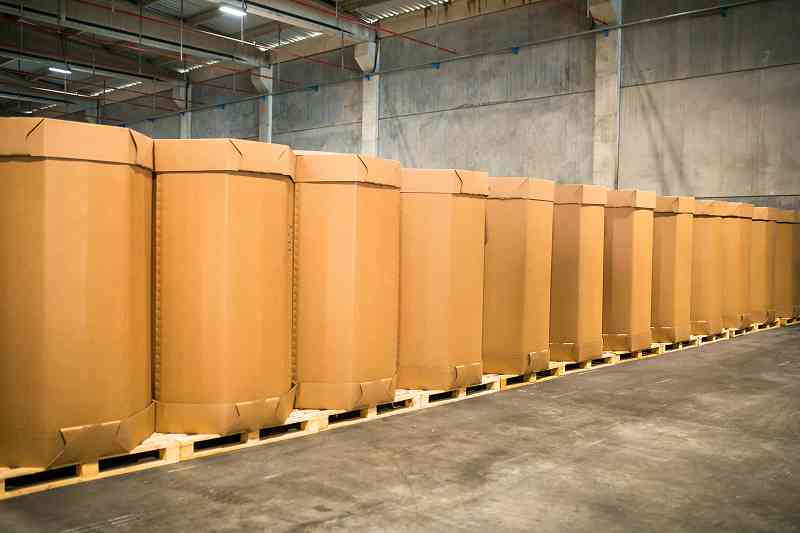Gaylord Box Dimensions: A Complete Buyer’s Guide
Standard footprints, common heights, and simple steps to pick the right size.

Key takeaways
- Most common footprint: 48" × 40"; typical heights run 24"–60" for pallet-friendly handling.
- Pick size by process: Choose height for access (hand load) or volume (forklift).
- Verify measurements: Confirm internal vs. external dimensions before purchasing.
FAQs
What are the dimensions of a Gaylord box?
Most listings use a 48" × 40" footprint with heights from 24" to 60".
What are standard Gaylord box dimensions?
While there is no single standard size for Gaylord boxes, certain dimensions are far more common than others. Based on our product data, the most frequently available and widely used Gaylord box size is 48" x 40" x 40".
We currently offer over 300 different Gaylord boxes in this size, making it the most popular and practical “standard” dimension across most industries.
Do Gaylord container dimensions match pallets?
Yes — most Gaylord boxes are designed to fit the most common pallet sizes. Typically, these containers match standard pallet dimensions such as 48" x 40" or 45" x 45" etc.
Are Gaylord bin dimensions different for resins or powders?
Dimensions are typically similar; many buyers still choose 48" × 40" × 36–45". For flowables, sellers often show octagonal bulk bins in that range.
What “Gaylord box dimensions” typically mean
Gaylord box dimensions refer to length × width × height of a bulk corrugated container built to sit on a pallet. In North America, 48" × 40" is the most common footprint; height is selected for the job at hand. The key is to match interior space to your product and handling method, then confirm that the full outside dimensions fit your aisles, racks, and trucks.

Standard sizes at a glance
Common footprints (length × width)
- 48" × 40" – Everyday footprint for warehousing and freight; widely stocked by major suppliers.
- 45" × 45" – Used when extra interior width helps with bulky items; available from corrugated bulk providers.
- 36" × 36" – Space-constrained areas and lighter loads (check supplier listings for current availability).
Common heights
- 24–30" (low profile): Easier hand loading and inspection.
- 36–42" (standard): Balanced capacity and stack stability for most operations.
- 48–60" (tall): Maximizes cubic feet when loading is equipment-assisted.
Tip: Listing titles often round numbers. When fit matters, request a measurement sheet and confirm internal dimensions—especially if you’re using liners or inserts.
Typical dimension ranges in listings
| Footprint (in) | Height range (in) | Typical uses |
| 48 × 40 | 24–60 | General storage, recycling, manufacturing, returns |
| 45 × 45 | 36–48 | Bulky materials, produce, textiles |
| 36 × 36 | 24–40 | Lighter parts, space-limited areas |
| 48 × 45 | 36–60 | Industrial scrap, heavy parts |
Popular dimension sets you’ll see
According to our data, these dimensions are what you're most likely to see available:
- 48" × 40" × 40" — The go-to “standard” for efficient stacking and handling.
- 48" × 40" × 36" — A standard footprint with less height than the popular 48" × 40" × 40".
- 48" × 40" × 41" — Seen in TOTECO's reinforced HPT (high performance tote).
- 48" × 45" × 40" — Wider 45" base for bulkier loads; common in industrial flows.
- 48" × 40" × 24" — Low-profile option for easy hand loading and line-side access.
- 45" × 45" × 40" — Square footprint with extra interior width for irregular items.



How to choose dimensions (simple checklist)
- Start with the footprint: Default to 48" × 40" unless your racking, conveyor, or product geometry needs another base.
- Pick a height based on loading:
- Manual work: 36–40" improves reach and speed.
- Forklift or conveyor: 45–60" can reduce container count and trips.
- Confirm internal vs. external size: Ensure liners, slip sheets, or inserts fit inside the box.
- Plan the stack and route: Measure doorways and racking, and verify safe unit (stack) height policies with your facility/carriers.
- Validate with a sample: If fit is tight or the application is critical, order one unit to test before a large buy.

Example use cases
- Loose, lightweight items: 48" × 40" × 36–40" for easy hand loading and frequent picks.
- Bulk, moderate density: 48" × 40" × 40–45" to add volume while keeping handling simple.
- High-volume programs: 48" × 40" × 45–60" to reduce container count per run (equipment loading assumed).

Wrap-up: pick size first, then verify
To select the right Gaylord box, start with a footprint and height that match your product and process—48" × 40" with 36–45" height covers most use cases. Confirm internal dimensions before purchasing, align sizes with rack and trailer constraints, and standardize where you can. With the right Gaylord box dimensions, you’ll improve capacity, speed up handling, and reduce freight cost.
Sources
- Uline — Bulk Cargo (Gaylord) Containers Index: https://www.uline.com/BL_412/Bulk-Cargo-Containers
- Greif — Corrugated Bulk Boxes (Gaylord-style): https://www.greif.com/corrugated-bulk-boxes/
- TOTECO Packaging — HPT®41 Data Sheet: https://toteco.com/wp-content/uploads/2025/02/HPT%C2%AE41-DataSheet-English.pdf

